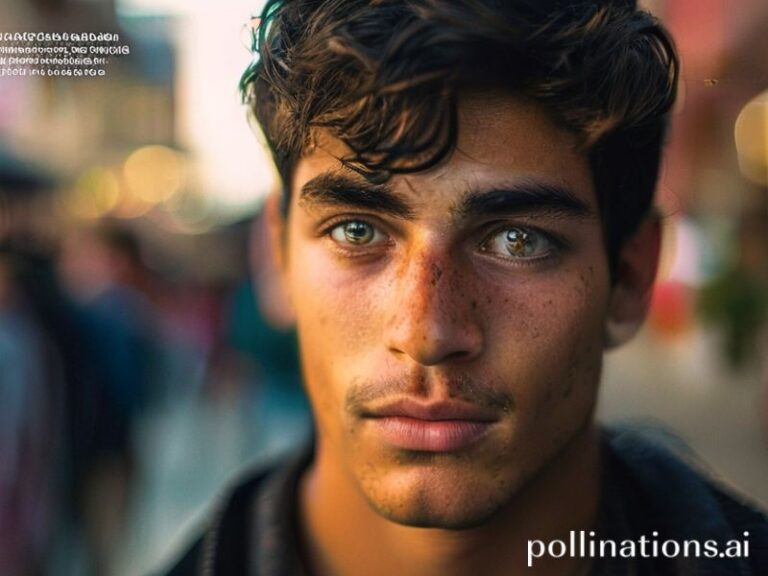Inka Williams: How the World Got Hooked on a Bikini-Climate Messiah
The Curious Case of Inka Williams: How a 20-Something From Byron Bay Became the UN’s Accidental Climate Poster Child
By Rufus Delacroix, International Affairs Desk
SYDNEY—If you’ve never heard of Inka Williams, congratulations: you still possess a few un-monetised neurons. The 24-year-old Australian model-cum-activist has spent the past decade perfecting the lucrative art of looking pensively at melting glaciers while wearing sustainably sourced hemp lingerie. Last week she was flown—business class, offset with the obligatory Instagram sapling—to Geneva so the United Nations could hand her a “Young Champion of the Earth” award, a title previously bestowed on people who actually build solar grids out of spit and scrap metal. Williams, by contrast, built a 4.7-million-follower TikTok where she lip-syncs Billie Eilish in front of endangered orangutans.
The planet, presumably, sighs with relief.
Williams matters not because she has discovered a new carbon-sequestration algae, but because she is the distilled essence of 21st-century climate discourse: photogenic, vaguely contrite, and marketable at 1080p. In an era when Thunbergian scolding has lost its influencer sheen, the global PR machine demands a fresher face—preferably one that can sell $400 “ocean-plastic” sneakers without visibly recoiling. Enter Inka, whose brand partners include a French luxury house that recently incinerated €30 million of unsold perfume stock for “brand integrity.” Nothing says planetary healing like eau de smokestack.
From Jakarta to Johannesburg, governments have noticed. Indonesia’s environment ministry—currently clearing another million hectares to plant nickel-rich palms—invited Williams to “walk the forest” in a staged replanting shoot. The saplings died within a month, but the ministry’s promo clip clocked 12 million views, outperforming their deforestation data set by roughly 12 million. In the Global South, where climate policy is often a choice between IMF loans and not breathing, Inka’s barefoot-in-bali aesthetic offers a soothing fiction: if pretty people recycle, maybe the drought will politely skip our village.
The West, meanwhile, uses her as a moral heat shield. European commissions point to her collaborations as proof that “youth are engaged,” a phrase here meaning “willing to be flown to COP summits for panel selfies.” After Williams posted a tearful apology for a 2019 Bali birthday balloon release that ended up strangling a sea turtle, the EU parliament cited her “accountability journey” in a 63-page report that accomplished everything except reducing emissions.
Yet the Williams phenomenon is bigger than one woman commodifying guilt. She is the logical endpoint of an economy that has turned survival itself into content. When the Maldives sinks, it will not be memorialised by scientists but by a squad of bikini-clad influencers paddling over submerged ballot boxes, #LastSwim. Inka is simply ahead of the tide, monetising apocalypse before it goes fully mainstream.
Investors have clocked the trend. London-based hedge fund Cerulean Capital recently launched the “Eco-Celeb Index,” tracking 50 green influencers’ share-price elasticity. Williams is their bellwether: every time she posts a “climate anxiety” carousel, renewable ETFs enjoy a modest 0.8 % bump, enough for Cerulean to siphon a few million before retail traders finish their morning kombucha. In the lexicon of high finance, this is called “impact investing,” the word “impact” here meaning “whatever photographs well.”
Still, mocking Inka is the easiest form of denial. The uncomfortable truth is that the world asked for her. We demanded climate action wrapped in thigh-high ethical boots, and capitalism—ever the obliging bartender—poured. If her carbon footprint is roughly that of a Slovenian village, so is yours every time you order next-day delivery of a biodegradable phone case. The only difference is she gets paid to pretend the plane runs on coconut oil.
So when Williams jets off to her next “plastic-negative” retreat in the Maldives, consider the mirror, not the selfie. Inka is not hijacking the climate movement; she is its inevitable spokesperson—equal parts confession and absolution, a sin-eater in recycled lace. The planet burns, the algorithm smiles, and somewhere a forest is renamed #InkaWood.
Welcome to the Anthropocene: brought to you by sponsored content.







